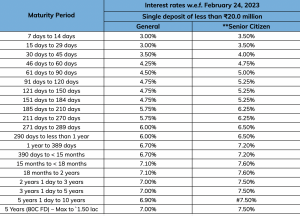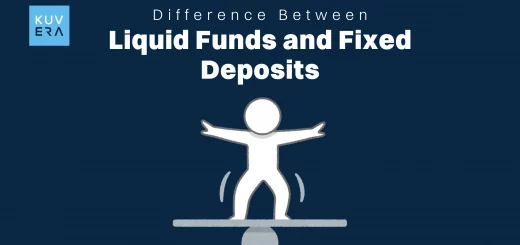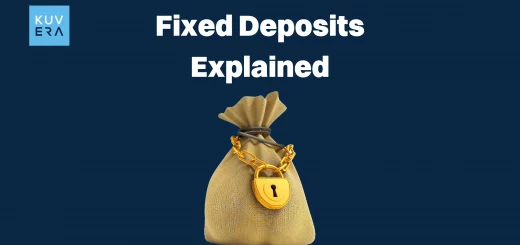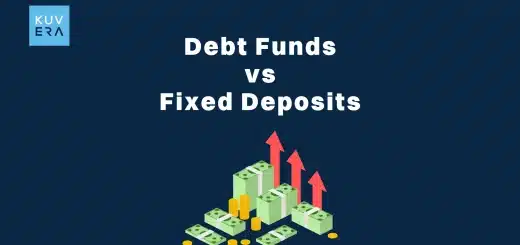Today we are going to discuss all about ICICI FD interest rates 2023 , we will also understand all about benefits of FD as well as the unique features offered by ICICI FD.
Fixed Deposits
Fixed Deposit or FD is a type of bank account where you deposit a certain amount of money for a set period of time, usually ranging from a few months to several years. The bank pays you a fixed interest rate on your deposit during this time. Once the term (or “tenure”) of the fixed deposit is over, you can withdraw the original amount you deposited along with the interest earned.
Fixed deposits are considered relatively safe because they offer a fixed return on your investment, and the money is typically locked in for the agreed-upon term, which means you cannot withdraw it before the tenure ends without incurring penalties.
Fixed deposit accounts are provided by the majority of the country’s main banks, with terms ranging from as short as 7 days to as long as 10 years or more. Customers can select a period that best suits their needs. The interest rate, once set, does not change throughout the period, and upon maturity, the person will get a lump sum amount that covers both the regular investments and the interest gained.
ICICI Bank Fixed Deposits
ICICI bank provides a variety of deposit options to facilitate both long-term and short-term investments by individuals. ICICI is one of the largest private sector banks in India, and its investment programs have a long history of impressive performance and outstanding returns, making them among the most dependable choices for investors.
Here are some of the features of ICICI FDs that might make it the right choice for you.
Some of the features of ICICI FD are as follows:
- Tenure: ICICI FDs provide flexible tenure options ranging from 7 days to 10 years. Investors can choose a tenure that suits their investment goals and financial requirements.
- Minimum Deposit Amount: The minimum deposit amount required to open an FD with ICICI Bank varies depending on the type of FD and the tenure chosen. It generally starts from as low as Rs. 10,000.
- Premature Withdrawal Condition: ICICI Bank allows premature withdrawal of FDs, subject to certain terms and conditions. However, there may be a penalty or reduction in interest rates for premature withdrawals. It is advisable to check the specific terms applicable at the time of opening the FD.
- Nomination Facility: ICICI Bank provides a nomination facility for FDs. Investors can nominate a person to receive the deposit amount in case of the depositor’s unfortunate demise, ensuring ease of claim settlement.
- Senior Citizen Benefits: ICICI Bank offers additional benefits to senior citizens on FDs. They can enjoy higher interest rates on their deposits, providing them with enhanced returns and financial security.
- TDS (Tax Deducted at Source): TDS is applicable on the interest earned from FDs as per prevailing tax laws. ICICI Bank deducts TDS if the interest exceeds the specified threshold. Investors can claim TDS credit while filing their income tax returns.
- Loan against FD: ICICI Bank provides the option to avail of a loan against FDs. Investors can use their FDs as collateral to obtain a loan, offering liquidity without breaking the deposit prematurely.
Lock Fixed Deposits at high rates now. Book with your existing bank account within minutes. Explore FD rates.
ICICI FD Interest Rates 2023
Here’s what the ICICI FD interest rates look like for general public and senior citizens.

Did you know NBFC fixed deposits are offering up to 9. 10% interest rate? Click here to explore rates.
Compare the ICICI FD rates with SBI FD interest rates here.
Benefits of a Fixed Deposit Account
Some of the major advantages of a fixed deposit account are as follows:
- Guaranteed Returns: FDs provide fixed and guaranteed returns in the form of interest rates, which are predetermined at the time of investment. This allows investors to know in advance how much interest they will earn on their deposit, making it a predictable investment option.
- Capital Preservation: FDs are considered relatively low-risk investments as the principal amount deposited is generally safe and secure, and is not subject to market fluctuations. This makes FDs suitable for conservative investors who prioritize capital preservation.
- Flexibility: FDs offer flexibility in terms of tenure, allowing investors to choose a term that suits their financial goals, ranging from short-term to long-term. This makes FDs adaptable to different investment objectives and time horizons.
- Regular Income: FDs can provide a regular source of income, especially when interest is paid out at regular intervals (monthly, quarterly, etc.), making it beneficial for individuals seeking regular income, such as retirees or those with fixed financial commitments.
- Diversification: FDs can be used as a part of a diversified investment portfolio to balance risk and returns. They can complement other types of investments, such as stocks, mutual funds, or real estate, to create a diversified investment portfolio.
- Loan Facility: Many banks allow customers to avail loans against their fixed deposits, providing a convenient source of credit without breaking the deposit prematurely. This can be beneficial in times of emergencies or unexpected expenses.
- Nomination Facility: FDs often allow customers to nominate a beneficiary, which can help in smooth transfer of the deposit to the nominee in case of unforeseen events, ensuring that the depositor’s wishes are honored.
- Senior Citizen Benefits: Some banks offer higher interest rates for senior citizens on fixed deposits, providing an additional benefit to individuals above a certain age.
It’s important to note that the specific benefits of fixed deposits may vary depending on the terms and conditions of the particular FD and the prevailing market conditions. It’s advisable to carefully review the terms and conditions, interest rates, and other features offered by the bank or financial institution before investing in a fixed deposit.
FD Calculator
Fixed Deposits (FD) are a savings option that helps one save for the future. Like with any other type of savings account, the interest rate on FDs varies from bank to bank. For various time periods, interest rates in Indian banks usually range between 6 – 9%. The interest rate for a senior citizen’s FD account is slightly higher than the regular accounts. Most banks give senior citizens an additional rate of between 0.25% and 0.75%.
To compare various FDs based on their interest rates, you can easily use the online FD interest and returns calculator.
Advantages of using an Online Fixed Deposits Interest Calculator
The process of calculating interest on repeated deposits can be difficult and time-consuming. Some of the benefits of using an FD online calculator are as follows:
- Simple to use: Utilizing an FD calculator is quite simple. All that is required is the entry of values for the monthly deposit, the rate of return on investment, and the number of years of investing. The maturity amount is correctly calculated by the FD calculator, you can do the same for RDs through RD Calculator.
- Time-saving: An investor can save time by using an FD calculator. In a matter of seconds, it completes complicated calculations. The investor no longer has to deal with the hassle of manual computations.
- Accuracy: If the inputs are entered correctly, the calculator is extremely accurate and there is no chance of error.
- Future Planning: The calculator provides the precise value of the return on investment, allowing investors to plan their future with extreme precision.
- Comparison: FDs are provided by banks and financial institutions. Investors can quickly compare the maturity values of several FDs using an FD calculator.
- Free to use: The RF calculator can be used numerous times by the investor for free to estimate the returns from FDs with different terms and interest rates.
About ICICI Bank
ICICI Bank is one of the leading private sector banks in India, providing a wide range of banking and financial services to individuals, businesses, and corporate clients.
ICICI Bank was established in 1994 as a wholly-owned subsidiary of ICICI Limited. It was among the first banks to be incorporated under the new guidelines of the Indian banking industry. Over the years, ICICI Bank has grown into a prominent financial institution and a trusted name in the Indian banking sector.
ICICI Bank offers a comprehensive suite of banking and financial products and services, including:
a. Retail Banking: It provides various services such as savings accounts, fixed deposits, loans, credit cards, wealth management, and insurance products tailored to meet the needs of individual customers.
b. Corporate Banking: ICICI Bank offers a range of solutions for businesses and corporate clients, including working capital financing, trade services, cash management, project finance, and other specialised banking services.
c. Investment and Wealth Management: ICICI Bank provides investment options like mutual funds, initial public offerings (IPOs), bonds, and other investment products. It also offers wealth management services, portfolio management, and financial planning for high-net-worth individuals.
d. Digital Banking: ICICI Bank has a robust digital banking platform that allows customers to access their accounts, make payments, transfer funds, invest, and avail various banking services through internet banking and mobile apps.
Conclusion
Fixed Deposit (FD) is India’s favorite investment option because it is one of the low-risk investment instruments with moderate and assured returns. Along with many other advantages, it offers users the ability to choose their investment amount and tenure. For the duration of the FD, interest is calculated at a fixed rate. The interest computation will be done at this rate regardless of fluctuating market trends or changes in the bank’s rules regarding the interest rate offered. As a result, investors don’t need to be concerned about market volatility. It also offers enough return to combat inflation and ensure that the value of your money is not diminishing.
Frequently Asked Questions (FAQs)
1. What are post office FDs? How are they different from bank FDs?
Post office fixed deposits (FDs) are similar to bank FDs, but with some key differences:
- Issuer: Post office FDs are issued by the Indian Postal System, while bank FDs are issued by commercial banks.
- Tenure: Post office FDs have fixed tenures of 1, 2, 3, or 5 years, while bank FDs offer more flexibility in terms of tenure.
- Interest Rates: Post office FDs have government-set interest rates, while bank FDs have rates determined by respective banks.
- Premature Withdrawal: Post office FDs can be withdrawn after 6 months with a penalty, while bank FDs may have different withdrawal penalties.
- Taxation: Post office FDs offer tax benefits under Section 80C, while bank FDs are subject to tax on interest earned.
- Nomination Facility: Both post office FDs and bank FDs generally offer a nomination facility.
- Risk Profile: Post office FDs are considered relatively safer, while bank FDs may carry some level of risk.
- Senior Citizen Benefits: Post office FDs offer higher interest rates for senior citizens, while bank FDs may also offer similar benefits.
2. Which type of FD is best?
The type of FD that is best for you will depend on your needs, requirement and investment goals. Here are the various types of FDs:
- Regular FDs: Standard fixed deposits offered by banks, where you deposit a lump sum amount for a fixed tenure and earn interest on it.
- Senior Citizen FDs: FDs specifically designed for senior citizens, usually offering higher interest rates compared to regular FDs.
- Tax-saving FDs: FDs that offer tax benefits under specific sections of the Income Tax Act, allowing for deductions on the invested amount.
- Cumulative FDs: FDs where the interest is compounded and reinvested with the principal amount, providing a lump sum at maturity.
- Non-Cumulative FDs: FDs where the interest is paid out at regular intervals, such as monthly, quarterly, half-yearly, or annually, providing a regular income stream.
- Flexi FDs: FDs that allow you to withdraw or deposit funds during the tenure without breaking the entire FD, providing flexibility in managing funds.
- Corporate FDs: FDs offered by non-banking financial companies (NBFCs) or corporate entities, usually offering higher interest rates but with higher risk compared to bank FDs.
- Special Term FDs: FDs with unique features, such as short-term FDs, long-term FDs, or FDs with special rates for a specific group of customers or during promotional periods.
Interested in how we think about the markets?
Read more: Zen And The Art Of Investing
Watch/hear on YouTube:
Start investing through a platform that brings goal planning and investing to your fingertips. Visit kuvera.in to discover Direct Plans and Fixed Deposits and start investing today.











